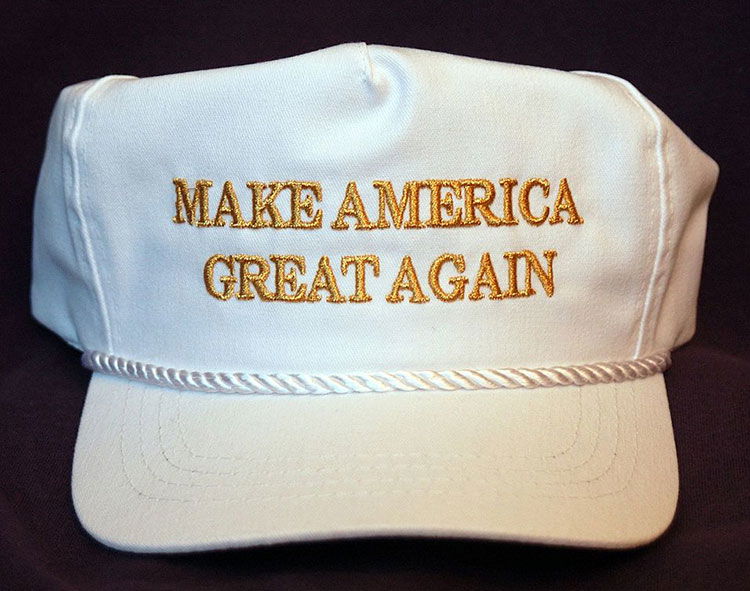What Does Make America Great Britain Again Mean
 When the Ramble Convention adjourned in September 1787 and the delegates streamed down the steps of Independence Hall, i of their number, Benjamin Franklin, of a sudden found himself nether ambush. Eager to hear what form of government awaited America, a Philadelphian named Elizabeth Powell began prodding Franklin's lapel: 'Well, md, what have nosotros got, a republic or a monarchy?' The reply was instant: 'A republic, madam – if y'all can keep it.'
When the Ramble Convention adjourned in September 1787 and the delegates streamed down the steps of Independence Hall, i of their number, Benjamin Franklin, of a sudden found himself nether ambush. Eager to hear what form of government awaited America, a Philadelphian named Elizabeth Powell began prodding Franklin's lapel: 'Well, md, what have nosotros got, a republic or a monarchy?' The reply was instant: 'A republic, madam – if y'all can keep it.'
On Saturday, the outgoing vice-president, Joe Biden, expressed the same ambivalence. As he closed the first session of the 115th Congress, which officially confirmed the ballot victory of Donald Trump, Biden was overheard muttering 'God save the Queen'. Information technology was barely aural over the adulation just, in an election dominated past hot mic moments, information technology was also revelatory (and, thankfully, more than sanitary than the president-elect's 'locker-room talk').
What the remark revealed was not Biden's subconscious royalist sympathies but a deeper unease about the wellness of the American republic nether a Trump presidency. He seemed to suggest that if Americans were prepared to elect Trump – a man politely described equally 'temperamentally unfit' for the top chore – maybe they could no longer 'go along' their republic? Indeed, if the break-away from the British Empire, the Declaration of Independence and the American Revolution could lead to Trump, were they conceived in error?
On one level, we should probably not read as well much into Biden's whispers. They were clearly tongue-in-cheek and the vice-president has a long history of foot-in-mouth mishaps. All the same, information technology was an odd sort of protest. Americans have never really expressed regret about overthrowing monarchy. Even during the dour wintertime of 1777, when it seemed that the American Revolution might be crushed by British armed services might, few of the patriots believed that life would be better under George III.
True, the United states did not rid itself instantly of its monarchical habits. Ane early on patriotic song, first sung in 1786, even took the melody of the royal anthem and fix it to new lyrics: 'God Save Smashing Washington!' But a render to the bosom of the British monarchy has never featured in the American repertoire of alternative political futures. The Loyalists who did not flee during the Revolution – about 400,000 of them – failed to class a serious opposition force in the nascent United States. The political tussles of the early commonwealth would happen betwixt republicans, non against royalists. Monarchy was expelled from American shores in 1776, never to return.
Some historians have nevertheless queried the republican credentials of the United States. Eric Nelson has argued that when America created its constitution, it also created an executive role of such ability – the presidency – that it was kingly in all but name. This is compelling, but the American Revolution also knocked expressionless the hereditary principle. It may well take been 'a revolution in favour of royal power', equally Nelson contends, but it was not a revolution in favour of kings or courts. Americans have never been shy nigh decapitating their political dynasties. Just enquire Hillary Clinton.
What Biden's mock royalism revealed was not a desire to revise the Declaration of Independence, just a sense of fear and futility. 'Information technology's over', he shouted, as Democrat legislators vainly protested the confirmation of Trump's victory. His parting gaffe betrays a crease of concern, as yet half-formed, that a crunch is approaching for American democracy. Anyone who watched a nanosecond of the 2016 presidential race will know that this is non a ridiculous suggestion. The election of Donald Trump did not impale satire; it destroyed hyperbole, which is why the journalist Andrew Sullivan tin can justifiably – and without exaggeration – merits that it represents 'an extinction-level event'.
Many of the Founding Fathers believed that republics were naturally prone to peril, dependent as they were upon the virtue and vigilance of ordinary citizens, not the skillful governance of a monarch. Collapse, as Franklin ominously observed, is always around the corner. There is nix new about this fearfulness. But today, with the election of a president who cares petty for the institutional integrity and political norms of the American commonwealth, the potential for peril has never seemed and then existent.
In this sense, Biden's announcement of 'God Salvage the Queen' is an historically unusual response to an historically unprecedented election result. Voters in the U.s.a. have never wanted to brand America Great Uk again. They may entertain an affection for the 'quaint' British royals, only they do not want to exist governed by them. Then once more, they have never seen a president quite similar Trump, either. #MAGBA may yet catch on.
Rhys Jones is Research Fellow in History at Sidney Sussex College, University of Cambridge.@rhyshistorian
Source: https://www.historytoday.com/make-america-great-britain-again
0 Response to "What Does Make America Great Britain Again Mean"
Enregistrer un commentaire